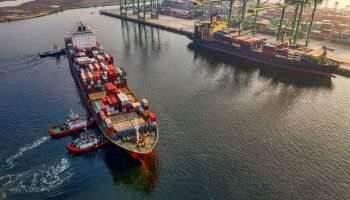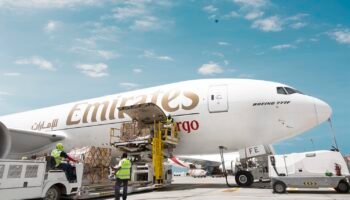Sea Freight Forwarding in Deved Shipping, Dubai

We are well-acknowledged for providing prompt International Sea Freight Forwarding service to the clients. We have an excellent relationship with all major shipping lines and enjoy very special export and import rates to all destinations in the world. We are well-known Sea Freight Forwarders in Dubai, So We handle door-to-door delivery of commercial consignments. Our team of employees who are specialists in sea cargo movements will take all our customer’s head-aches to ensure that the cargo reaches the destination in time, as per schedule, at a very competitive rate.
Why Choose Our Sea Freight Forwarding Service?
A skilled team of professionals
Door-to-door delivery
Prompt delivery
Cost-effective prices
International Sea Freight Forwarding service
Ocean freight is usually the foremost efficient thanks to cover long distances at rock bottom cost, especially when you’re handling large quantities of products. the main ports in both our Port of Jebel Ali and Mina Rashid are conveniently located near major highways and are only a brief drive from the cities’ downtown areas.
In addition, Deved shipping operates storage and warehousing facilities near the main ports in the city. These locations are equipped with stringent security measures to guard your cargo. Our security includes 24/7 video monitoring with 30+ day retention, patrolled yards, and cell-connected security systems.
Frequently Asked Questions
Still open questions?
The size of general cargo or multi-purpose ship varies greatly, although they have a tendency to be rather small consistent with freight carrier standards. they’re generally between 5,000 and 25,000 DWT.
We can distinguish between different sorts of ships for maritime transport, counting on the load they transport:
- General freighters: These are basic cargo ships; they will carry freight but haven’t any space for containers.
- Container ships: Ships specially designed to hold goods in containers. They monopolize the bulk of international dry freight transport and represent quite a half of all maritime trade.
- Bulk carriers: The vessels best suited to transporting solid bulk cargoes.
- Oil/gas tankers: Special tankers for transporting petroleum and by-products differentiated by their superior technical characteristics; all of them guarantee water tightness and structural resistance. Gas tankers have more sophisticated technology for storing liquefied gas and are divided into carriers of GNL and GLP, as long as all must be kept at a special pressure and temperature.
- Reefer ships: Transport perishable food and commodities which must generally be preserved at very low temperatures
- Ro-Ro ships: Have ramps and platforms for transporting vehicles with wheels, from private cars to industrial vehicles and loaded trucks. There also are hybrid versions of those ships which combine vehicle and passengers transport (ferries) et al. that transport vehicles carrying containers (Ro-Lo)
Oil tankers are purpose-built ships designed to move petroleum or petroleum products.
they need a pumping system that permits them to load and unload petroleum. Oil tankers are the sole alternative to pipelines for transporting oil from the rigs to the ports for his or her onward travel from there to the refineries.
Ro-Ro ships are vessels designed to move vehicles on wheels, i.e. cars, trucks, or industrial vehicles.
Sometimes they need built-in ramps for the loading and unloading of vehicles.
The fact that the cargo can access the ship under its own steam removes the necessity for a crane, thus reducing the intermediary costs associated with loading, unloading, and storage.
These ships can only carry wheeled vehicles and mustn’t be confused with Ro-Pax vessels, like ferries, which combine the transport of vehicles and passengers.













